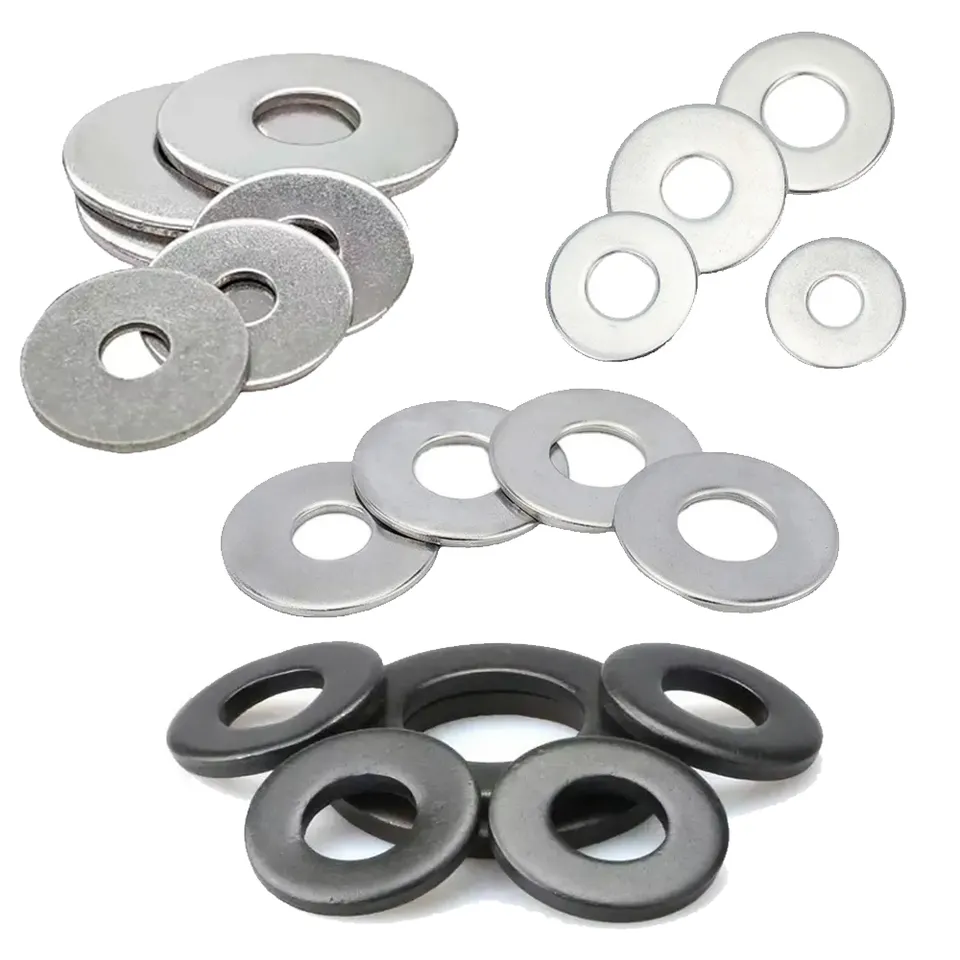Flat Washer Manufacturer In China
Ningbo Teng Qi Fasteners Co., Ltd is a professional flat washer manufacturer, we are committed to providing high-quality, reliable products with advanced production equipment and strict quality control processes. Our production line is equipped with professional stamping equipment and heat treatment production lines to ensure that the dimensional accuracy and hardness of the products meet standard requirements.
We pay attention to every detail of product quality, from the selection of raw materials to the control of production processes, and strictly implement international standards and industry regulations. Our team is experienced and skilled, ensuring that every batch of products meets customer requirements and expectations.
In addition to product quality, we also focus on cooperation and communication with customers. Our team upholds professionalism and is dedicated to providing customers with customized solutions and providing timely pre-sales and after-sales services to ensure customer satisfaction and trust.

Feature of flat washer:
| Load Distribution: | When a bolt or screw is tightened, the flat washer helps spread the load evenly across the surface, reducing the risk of damaging the material. |
| Surface Protection: | Flat washers prevent the fastener from digging into softer materials like wood or plastic, preserving the integrity of the material. |
| Alignment: | In situations where the hole in the material doesn't align perfectly with the bolt or screw, a washer can help align the fastener correctly. |
| Material Compatibility: | Depending on the material used (metal, rubber, plastic, etc.), washers can provide insulation, cushioning, or corrosion resistance. |
| Reducing Friction: | Washers can also reduce friction between the fastener and the surface, allowing for easier tightening. |
Flat washers come in various sizes, materials, and thicknesses to suit different applications. Common materials include steel, stainless steel, brass, nylon, and more. The choice of washer size and material depends on the type of fastener, the materials being joined, and the intended application.
Overall, flat washers are a simple but essential component in mechanical assemblies that help improve the efficiency, stability, and longevity of connections between fasteners and materials.
Specification:
The specifications of flat washers can vary depending on factors such as size, material, thickness, and intended application. Here are some common specifications that are often provided for flat washers:
| Size: | Flat washers come in various sizes, and the size is typically specified using the inner diameter (ID), outer diameter (OD), and thickness. For example, a specification might be "M8, ID 8mm, OD 16mm, thickness 1.5mm. |
| Material: | Flat washers can be made from a range of materials, including steel, stainless steel, brass, nylon, rubber, and more. The material choice is influenced by factors such as corrosion resistance, load-bearing capacity, and intended application. |
| Inner Diameter (ID): | The inner diameter is the size of the hole in the center of the washer, through which the bolt or screw passes. |
| Outer Diameter (OD): | The outer diameter is the overall diameter of the washer. |
| Thickness: | The thickness of the washer determines the distance between the bearing surfaces and affects how it distributes the load. |
| Finish: | Some flat washers may have a specific finish applied to them for aesthetics, corrosion resistance, or other purposes, such as zinc plating or galvanization. |
| Standard: | Flat washers may adhere to specific international standards, such as ISO, DIN, ANSI, or other industry standards. |
When selecting flat washers, it’s important to consider these specifications to ensure that you choose the right washers for your intended application. The specifications will help you match the washer’s characteristics with the requirements of your project, including the type of fastener, load-bearing capacity, and material compatibility.
Application:
Flat washers have a wide range of applications in various industries and settings. They are used to enhance the performance, reliability, and safety of fastening assemblies. Some common applications of flat washers include:
| Construction: | In construction projects, flat washers are used to secure structural elements such as beams, columns, and brackets. They help distribute the load and prevent damage to the materials. |
| Automotive: | Flat washers are found in automotive applications, including engine components, chassis parts, and body panels. They contribute to secure and stable connections that withstand the vibrations and stresses of driving. |
| Machinery: | In industrial machinery, flat washers are used to fasten parts together, ensuring smooth operation and preventing wear and tear. |
| Furniture: | Flat washers are used in furniture assembly to reinforce connections, prevent damage to wooden surfaces, and improve stability. |
| Electronics: | Flat washers can provide insulation and prevent electrical contact between components in electronic assemblies. |
| Plumbing: | In plumbing installations, flat washers are used to create a tight seal between connections, preventing leaks and ensuring proper function. |
| Aerospace: | The aerospace industry employs flat washers in aircraft assembly to secure critical components and ensure the structural integrity of the aircraft. |
| Woodworking: | In woodworking applications, flat washers prevent fasteners from digging into wood, reducing the risk of damage and allowing for secure connections. |
| Renewable Energy: | In solar panel installations, flat washers are used to secure panels to mounting brackets and prevent over-tightening that could damage the panels. |
| Mechanical Engineering: | Flat washers are a fundamental component in mechanical engineering for their ability to evenly distribute load and prevent damage to surfaces. |
Flat washers come in various sizes, materials, and types to suit specific applications. It’s important to choose the appropriate washer based on the type of fastener, material being fastened, load requirements, and environmental conditions.
Surface treatment of choice:
| Surface treament | Feature | Benefits |
|---|---|---|
| Black Oxide Coating | Creates a dark or black surface finish through a chemical reaction. | Enhances appearance, provides some corrosion resistance, reduces glare, and can offer moderate wear resistance. |
| Zinc Plating (Electroplating) | Provides a thin layer of zinc coating on the surface. | Offers moderate corrosion resistance, enhances appearance, and can act as a sacrificial barrier against corrosion. |
| Hot-Dip Galvanizing | Immerses the bolts and nuts in molten zinc to create a thicker coating. | Provides strong corrosion protection, suitable for outdoor and harsh environments, forms a durable and rugged coating. |
| Mechanical Galvanizing | Uses mechanical means to apply a zinc coating. | Offers good corrosion protection, especially for high-strength bolts, less risk of hydrogen embrittlement compared to hot-dip galvanizing. |
| Dacromet Coating | A sacrificial coating that includes a mix of zinc and aluminum flakes. | Offers exceptional corrosion resistance, suitable for extreme conditions, provides consistent friction control, and maintains coating integrity even under mechanical stress. |
How do we ensure the quality of flat washer?
In a world where connections matter, Ningbo Teng Qi Fasteners is more than just a fasteners supplier and manufacturer. We are architects of stability, builders of relationships, and champions of your success. From skyscrapers that reach for the sky to machines that power industries, our fasteners form the backbone of progress. When you choose Ningbo Teng Qi Fasteners, you choose unwavering quality, exceptional service, and a partner who understands that every bolt holds a piece of your vision.
| Control Method | Detail |
|---|---|
| Material Inspection: | Verify the material's composition, heat treatment, and quality upon receipt. Conduct metallurgical analysis to ensure the material properties meet the standards. |
| Process Control: | Implement strict process control measures for heat treatment, machining, threading, and any other manufacturing steps. Maintain consistent process parameters to ensure uniform quality. |
| Inspection Points: | Introduce inspection points at various stages of manufacturing to check for defects, dimensions, and quality. Inspect threading, dimensions, surface finish, and other critical parameters. |
| Sampling and Testing: | Regularly sample products for testing, such as tensile testing, hardness testing, and metallurgical analysis, to ensure they meet the required specifications. |
| Thread Inspection: | Thoroughly inspect threading using proper thread gauges to ensure accurate dimensions and fit with mating components. |
| Traceability: | Implement a traceability system to track each fasteners journey from raw material to final product. This aids in accountability and recalls if necessary. |

